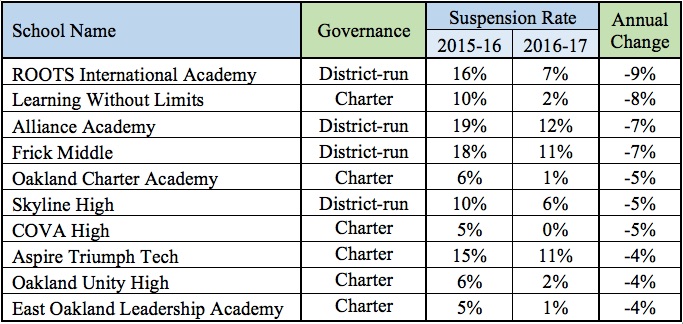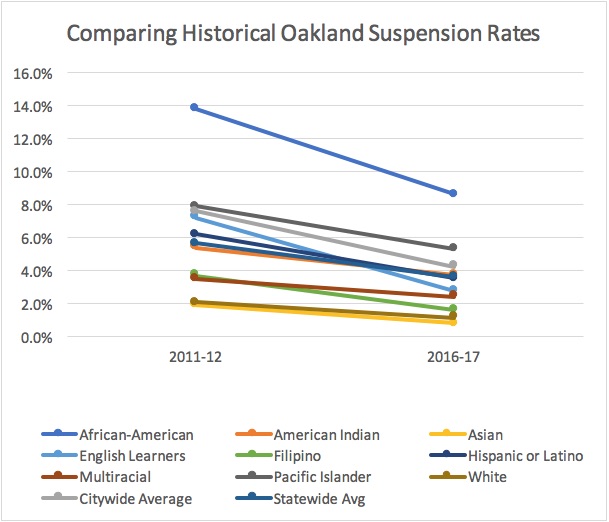Usually a letter signed by the ACLU to your school or district is not a good thing. This one was a pleasant surprise sent to our principal, Leo Fuchs, at Learning Without Limits, recognizing the success in eliminating “willful defiance” suspensions. This mirrors some broader statewide efforts, that are starting to gain traction and that we should support.
But before we dig in there, the letter, or at least part of it. (Full letter can be found at the end of the post.)
Dear Leo,
We are writing to inform and congratulate you on your below average suspension rate and for being one of the California schools that did not report a single student suspension for “defiance” in the 2016-17 school year. The defiance category is one of the most frequently used reasons for suspensions across the state and it disproportionately deprives our most vulnerable students of their education. Nearly 500 schools across the state used the defiance category in at least half of their suspensions. Several California schools also had more defiance suspensions than students enrolled. However, your school has created and maintained a school climate that supports the academic and social emotional development of your students, and we commend you for it.
Many educators and experts agree that suspension for minor and vague reasons are harmful to both students and school climate. Discipline gaps contribute to achievement/opportunity gaps. Black and Latino boys are only 28% of California’s students, but they were 54% of defiance suspensions.
I have to commend Oakland schools for taking the lead on this issue and really having an effect. “Willful defiance” was one of the worst reasons to suspend kids, and we know who felt the lash the most.
Basically you didn’t do what I told you to, so go home. This hurts students, hurts schools, and really lets individual staff members off the hook for connecting with students and educating them.
Broader Trends and Successes in Oakland, and Next Steps
Overall this has been an area of progress for Oakland with several schools showing outstanding results around reducing suspensions and also overall rates. The Educate78’s Crunched blog covered these so take a look at their piece, but you can see the table of schools really doing outstanding work.
And also the overall trends in the right direction.
Thankfully, as covered by EdSource, these issues are getting more statewide attention, where a ban on “willful defiance” for grades K-3 has been extended indefinitely, some additional funding has been put into discipline reform and there is talk of extending the grade span that the ban applies to up through eighth grade.
We owe our students better and it is great to see Oakland public school principals delivering, now let’s take it statewide.
You can see the full letter here:
Dear Leo,
We are writing to inform and congratulate you on your below average suspension rate and for being one of the California schools that did not report a single student suspension for “defiance” in the 2016-17 school year. The defiance category is one of the most frequently used reasons for suspensions across the state and it disproportionately deprives our most vulnerable students of their education. Nearly 500 schools across the state used the defiance category in at least half of their suspensions. Several California schools also had more defiance suspensions than students enrolled. However, your school has created and maintained a school climate that supports the academic and social emotional development of your students, and we commend you for it.
Many educators and experts agree that suspension for minor and vague reasons are harmful to both students and school climate. Discipline gaps contribute to achievement/opportunity gaps. Black and Latino boys are only 28% of California’s students, but they were 54% of defiance suspensions. This is extremely problematic considering school districts enrolling nearly 800,000 of California’s students have already banned defiance suspensions. This included the Los Angeles, San Francisco, Pasadena, Azusa, and Oakland Unified School Districts.
This July, the AB 420 protections that ensure nearly two million California students in grades K-3 are not suspended for defiance are set to expire. Although similar legislation (SB 607) proposes to extend these protections permanently and expand protections to all grade levels (for five years), students may be left vulnerable if it is not enacted.
Please complete our short survey for schools with remarkable discipline practices. We know there are ways to respond to common adolescent behaviors that do not include removing them from class and depriving them of an education. We hope to share this message and your success with Governor Jerry Brown, the media, and others.
Thank you for the work you do on behalf of California’s children.
Signed,
Angela McNair Turner
Cosponsors of SB 607
Anti-Defamation League
American Civil Liberties Union of California
Black Parallel School Board
Brothers Sons Selves Coalition
Children Now
Children’s Defense Fund – California
Fight Crime: Invest in Kids
Lawyers Committee for Civil Rights
Mid-City Community Advocacy Network
PolicyLink
Public Counsel
Youth Justice Coalition




Really charter schools are not suspending Black and Brown students? Do you have the data regarding Oakland privately managed schools? One school does not make a trend Mr. Tollotson. ACLU did not distinguish between Oakland Public School and Oakland’s PRIVATELY managed charter school.
Never said it made a trend and you can see the schools listed are a mix of district and charters, the ACLU looked at all the public schools, I would think you would be happy to see schools that were making a difference in terms of equity, but it seems labels are more important that how children and families are served
For 60 years the U.S. Government has financed suburbs and core city segregation. Our apartheid housing is reflected in America’s mostly segregated schools that are the working conditions for mostly white women to teach within after having been educated in a segregated white world within our Nation.
The partial status shown had public schools doing a better job of “reducing inequity”. Be real. Equity in a segregated system is separate and not equal and therefore a statistic game.
The privately managed charter schools nor the public schools address the housing segregation that is the learning and working conditions of students. Charter schools just made the segregation worse. And, that is why I am for a moratorium on charter school growth.
But, the problem too big to face is this Nation’s housing segregation that is the the source of the financial gap been white and Black and Brown families.